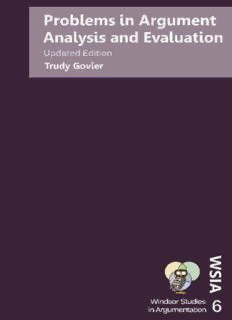
Problems in Argument Analysis and Evaluation PDF
Preview Problems in Argument Analysis and Evaluation
PROBLEMS IN ARGUMENT ANALYSIS AND EVALUATION Windsor Studies in Argumentation Volume 6 TRUDY GOVIER Windsor Studies in Argumentation Windsor Ontario Canada Problems in Argument Analysis and Evaluation byTrudy Govier & Windsor Studies in Argumentationis licensed under aCreative Commons Attribution-NonCommercial 4.0 International License, except where otherwise noted. Copyright Trudy Govier and Windsor Studies in Argumentation ISBN 978-0-920233-83-2 CONTENTS WSIA Editors v WSIA Editors' Introduction vii Preface viii 1. Rigor and Reality 1 2. Is a Theory of Argument Possible 20 3. The Great Divide 56 4. Two Unreceived Views about Reasoning and 84 Argument 5. The Problem of Missing Premises 123 6. A Dialogic Exercise 161 7. A New Approach to Charity 203 8. Reasons Why Arguments and Explanations are 242 Different 9. Four Reasons There are No Fallacies? 271 10. Formalism and Informalism in Theories of 311 Reasoning and Argument 11. Critical Thinking in the Armchair, the Classroom, 349 and the Lab 12. Critical Thinking about Critical Thinking Tests 377 13. The Social Epistemology of Argument 413 WSIA EDITORS Editors in Chief Leo Groarke (Trent University) Christopher Tindale (University of Windsor) Board of Editors Mark Battersby (Capilano University) Camille Cameron (Dalhousie University) Emmanuelle Danblon (Université libre de Bruxelles) Ian Dove (University of Nevada Las Vegas) Bart Garssen (University of Amsterdam) Michael Gilbert (York University) David Godden (Michigan State University) Jean Goodwin (North Carolina State University) Hans V. Hansen(University of Windsor) Gabrijela Kišiček(University of Zagreb) Marcin Koszowy (University of Białystok) Marcin Lewiński(New University of Lisbon) Catherine H. Palczewski (University of Northern Iowa) Chris Reed (University of Dundee) Andrea Rocci (University of Lugano) Paul van den Hoven (Tilburg University) Cristián Santibáñez Yáñez (Diego Portales University) Igor Ž. Žagar (University of Maribor & University of Primorska) Frank Zenker (Lund University) PROBLEMSINARGUMENTANALYSISANDEVALUATION v Windsor Studies In Argumentation Centre for Research in Reasoning, Argumentation and Rhetoric University of Windsor 401 Sunset Avenue Windsor, Ontario, Canada N9B 3P4 viTRUDYGOVIER WSIA EDITORS' INTRODUCTION We are pleased to publish this WSIA edition of Trudy’s Govier’s seminal volume, Problems in Argument Analysis and Evaluation. Originally published in 1987 by Foris Publications, this was a pioneering work that played a major role in establishing argumentation theory as a discipline. Today, it is as relevant to the field as when it first appeared, with discussions of questions and issues that remain central to the study of argument. It has definedthemainapproachestomanyofthoseissuesandguided the ways in which we might respond to them. From this foundation, it sets the stage for further investigations and emerging research. This is a second edition of the book that is corrected and updated by the author, with new prefaces to each chapter (but without the previous appendix). We want to acknowledge the work of Ms. Tamilyn Mulvaney who assisted in the editorial process and prepared the final manuscript for publication. Leo A. Groarke Christopher W. Tindale PROBLEMSINARGUMENTANALYSISANDEVALUATION vii PREFACE Preface to the First Edition My interest in the subjects covered in this book dates from 1978, when I came across several texts in informal logic, and was fascinated both by their practicality and by their recommendationsforrethinkingcentralphilosophicaltraditions regarding logic and argument. I thought at that time that very fundamental issues were at stake but that the context of textbooks did not provide sufficient opportunities to explore them in depth. This book is an attempt to fill that gap. I have profited very much over the intervening years from philosophical exchanges with Tony Blair, Ralph Johnson, and David Hitchcock. Comments and analyses from Jonathan Adler, Douglas Walton, Richard Paul, Dennis Rohatyn, John McPeck, David Ennis, Frans van Eemeren, and Rob Grootendorst have also been helpful, as have the interesting questions posed when parts of this book have been read to audiences in Canada (Lethbridge, Windsor, Calgary, Ottawa, Edmonton, Saskatoon, Waterloo, and Peterborough); the United States (Newport News and Sonoma); and the Netherlands (Amsterdam). Materials on critical thinking tests were willingly supplied by Matthew Lipton, Robert Ennis, Stephen Norris, and John McPeck, whose cooperationisappreciated.Iwouldalsoliketothanktheeditors and contributors to the Informal Logic Newsletter (now the journalInformalLogic)fortheirinterestin,andcommentson,my work, especially in the period 1979-1982. viiiTRUDYGOVIER IamextremelygratefultotheSocialSciencesandHumanities Research Council of Canada for generous financial support during the period 1982-1984. Without this support, the book would not have been completed. Trent University also provided some support in 1981, enabling Jennifer Dance Flatman to lend valuable bibliographical assistance. Equally important has been moral support – especially that of David Gallop, William H. Dray, Bernard Hodgson, Sandy McMullen, Michael Scriven, NettieWiebe,JanetKeepingand,mostofall,myhusband,Anton Colijn. For errors or omissions that may remain, I am solely responsible. Prefaceto the Second Edition Formanyyears,thisbookhasbeendifficulttoobtain,andIfelt badlyaboutthat.IwasdelightedtolearnthattheseriesWindsor Studies in Argumentation was interested in re-publishing the work so as to make both electronic and print versions available. After some difficulties, I was able to retrieve the copyright from the large Walter de Gruyter firm (Berlin), which had taken over the original publisher, Foris (Dordrecht, the Netherlands) and dramaticallyincreasedthepriceofthework.Hopefully,thisnew edition will be accessible to all who wish to consult it. People often expressed to me their frustration about the inaccessibility of the original book. They did not indicate a desire for a re- working of its themes in the light of subsequent research. That, in any event, would require a massive amount of work. In this secondeditionIhaveforthemostpartkepttheoriginalmaterial intact, while adding introductory essays to each chapter in an effort to convey my present sense of what I said decades ago. This book was an early one in the development of informal logic and argumentation studies. My youthful excitement about topicsandproblemsinthesefieldsstemmedofcoursefromtheir intrinsic interest but also from my sense that they had rarely been explored and seemed to emerge, when they did, mainly from pedagogical experience and treatments in textbooks. I PROBLEMSINARGUMENTANALYSISANDEVALUATION ix
Description: